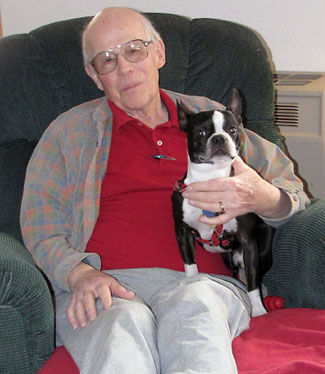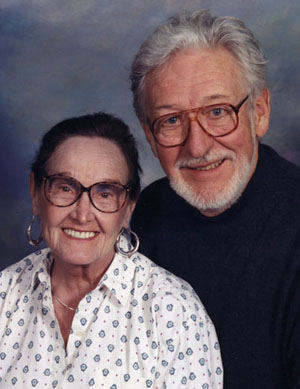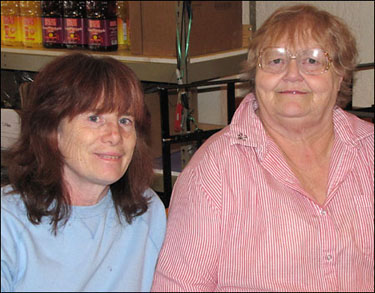 Ken Westman and his Boston bulldog Snoopy. Photo by Karen West Methow winters are long and can be treacherous. Just ask Ken Westman, who fell in early February on a patch of water-covered ice as dusk was turning to dark. He landed on his right hip – the one that had been replaced eight years earlier – and fractured his femur, the large upper leg bone.
As is typical, the fall was a split-second event. Westman, a fit 76-year-old who is a regular at local yoga and exercise classes, was walking the short distance from a parked car to the Methow Valley Inn in Twisp for a supper-club event. He was with a buddy, and help was quickly summoned. Still, he spent time laying in an icy puddle with blankets piled on top before being taken to a hospital room in Wenatchee -- without his supper. Surgery followed and two weeks in residential rehabilitation.
Like others in this rural valley who live alone or are caring for someone, Westman has learned a great deal about the generosity of friends and neighbors, and the variety of care-giving services that are available here to those who need them. Fortunately, he's been able to afford health insurance to cover the costs, which not everyone can. However, as Sue Baldwin, one of the valley's professional caregivers said, "There is always help available," some of it free or low-cost.
Westman's description of his experiences, and those of others featured in this story, are being shared to assist those facing the need for help.
Westman has looked at caregiving from both sides now. He was his wife Elaine's longer-term caregiver for the last year of her life. But his own recent fall meant he needed temporary help himself. Westman, who is outgoing and active in the community, has friends and neighbors who organized immediately. They arranged transportation, housekeeping and meals.
“For the first six nights I was home, a different person brought dinner every night," he said. And most nights anywhere from one to three people stayed and ate with him. A family member did the grocery shopping and picked up mail. Now, well into his recovery period, Westman has in-home physical therapy and is driving himself on errands. In fact, he drove himself to a supper-club event March 19. But the onetime commercial fisherman said he will keep the housekeeper because "I hate to dust" and needed to get that help before the fall.
 Virginia and Jerry Sparling, a couple of decades ago. Photo courtesy of Jerry Sparling As for the equipment essential for someone in his predicament, he said, “I had most of the stuff I needed for Elaine.” That "stuff" included a bath bench, raised toilet seat and walker that were stored in the barn. Thanks to the person who put on snowshoes and trekked to the barn, everything was clean and ready to use the minute he got home. The house already had a wheelchair ramp and bathroom grab bars. “I had to have a wheelchair for Elaine,” Westman explained. He added that Bob Ulrich, owner of Ulrich's Pharmacy in Twisp, loaned them the wheelchair free of charge. Ulrich said he loans wheelchairs, walkers and crutches to people who need them on a short-term basis. It is mostly equipment he bought outright to avoid the paperwork involved in billing Medicare and other insurance providers. When he can't meet a request, he refers people to commercial medical equipment suppliers.
But typical of the local spirit of sharing, Westman said, “I have a hospital bed somewhere in the valley. I had it for Elaine and now it’s floating.” Elaine Westman was bedridden the last three months of her life. “She started stroking and lost her mobility,” Westman said, adding that she wanted to be at home, and about two or three months before she died, she said, " 'No more hospitals.' She was a gol-danged independent Montana farm girl," he added. "I just had to be patient."
And be trained as a caregiver. “I’ll have you know I’m a certified bath girl,” he said, chuckling. A nurse came to the house and taught him how to make a bed with a person in it, and how to bathe his wife. He also learned how to transfer her safely from the wheelchair to the bed and from the chair to the bath bench. He became an expert at watching for, and treating, pressure sores. “We ended up with one of those pressure mattresses,” he said. The training was provided through an Okanogan County public health agency.
Westman, as caregiver, also worked with Hospice and can't say enough good things about the organization. “Hospice is really important,” he said. “Anybody who avoids using them is making a big mistake. They can make everything so much easier.” After Elaine died, Westman attended a Hospice-sponsored monthly support group for a year, which he found very helpful. It worked a bit like Alcoholics Anonymous, he said. There usually were eight to 12 people attending and they all understood that "What's said here, stays here." Participants felt free to share their problems. “It was part social and part helping each other.”
 Professional caregiver Sue Baldwin, left, and Shirley Lewis, who is taking care of her husband John. Photo by Karen West Ken and Elaine Westman both came to the Methow in 1967 but they didn't know one another. They married in 1972 and lived in a series of houses as their needs changed, including the one where Ken resides now. They've been surrounded by good neighbors, one of whom is Jerry Sparling, the friend Westman was with the night he fell. The supper-club outing was to have been an evening of respite for Sparling, who was taking care of his wife Virginia at the time. Both Sparlings were interviewed about caregiving for this story 11 days before Virginia died on Feb. 24 at age 87. At that time she could sit up for about 30 minutes and needed nearly constant care. "He's a prince but he also needs some respite," she said of her husband, who had been her primary full-time caregiver for several years. The needs intensified after Virginia fell and broke her hip in 2010. She also injured both feet and couldn't stand up. After a life of independence and uncommon accomplishment, she needed help with just about everything.
Jerry Sparling, a retired medical doctor who recently turned 85, did whatever was necessary. He managed his wife's medications and did 90 percent of the cooking before Virginia's hip-fracturing fall. From that point on they had periodic in-home helpers. Virginia said, "The neighbors have just been absolutely wonderful."
The Sparlings became full-time valley residents in late December of 1996. Both were very active in the valley socially and with non-profit organizations. "In our sixties and seventies we were quite active in things in the valley," he said. Asked if the couple ever considered moving back to Seattle, Virginia said, "We wouldn't have the support system over there that we have here." Neither Sparling ever wanted extraordinary, life-supporting type medical care, which Jerry especially had seen up close. "One of the reasons we moved over here is that in the big city we had multiple communities that weren't related," he said. "Your communities shrink as you get older... By the time I'm demented everybody [in the Methow Valley will] know me and will tell me the way home."
Caregiving Resources
Samples of local individuals
and programs that can provide information and/or referrals
Aging and Adult Care of Central Washington
Direct and contracted services
to seniors and vulnerable
adults with disabilities
509-886-0700
www.aaccw.org
Amedisys Hospice
1-877-422-8621 (Omak)
Barbara Wallace is the
local coordinator.
Sue Baldwin
A local private home care provider who also works for an agency, and who can refer clients to other local caregivers 997-0431
Raleigh Bowden
a physician providing no-cost needs assessment, support and referral 509-341-4644
The Family Caregivers’ Support Group
Meets at 10:30 a.m. the third Tuesday of the month at Room One, 315 Lincoln St., Twisp
997-2050
Guardian Angels
Provides social contact for homebound individuals by
pairing trained volunteers with seniors, the chronically ill
or disabled individuals.
Coordinator:
Eunice Marchbank
996-2569
Ulrich's Pharmacy, Twisp
Loans wheelchairs, walkers and crutches on a short-term basis
997-2191 |
So having made the choice to stay put in a rural valley and needing help, this is what the Sparlings did. As Jerry put it, "Raleigh Bowden dropped into our life last summer. She's a very delightful, optimistic, happy person." Bowden, a semi-retired physician who specializes in end of life care, works with a small group of local clients free of charge. She put them in touch with Hospice, which they found helpful. She also had a hand in assessing what kind of help they needed.
Sue Baldwin coordinated a team of four trained women including herself, to provide that care. Jerry Sparling, who had been caring for his wife 24 hours a day, seven days a week, needed respite. Three days a week, from 2 p.m. until 8 a.m. the next morning, one of the paid caregivers was there and slept on a cot in Virginia's room so Jerry had some chance of getting a full night's sleep. One day a week a housekeeper came, which gave him a chance to take a short daytime break.
Baldwin is a Nursing Assistant Registered and holds certificates from a number of continuing education classes in care-giving specialties including dementia, diabetes and oral care. She works part-time as food manager at The Cove in Twisp, as-needed at Jamie's Place in Winthrop, for In Home Care of Central Washington, and has for many years done private-pay in-home care, sometimes tag-teaming with Karen Dahl, another trained local caregiver. Baldwin also is an unpaid volunteer for the Guardian Angel program.
"I have this heart to help people," she said recently. Baldwin's message to valley residents is this: "There are people out there who care...There are a lot of current and former care givers out there and people are still looking for work." She emphasizes that every situation is different in terms of what an individual needs, what help is available, and whether -- or what -- helpers charge for care. "There is no set rate," Baldwin said. "It's private," just as the client's health and medical needs are private. (As a range, some agencies charge $10 to $11 an hour and there are caregivers who've gotten up to $23 an hour.)
Shirley Lewis and her husband John live in Twisp. They don't have in-home help yet, but she sees the day coming when she'll have to research their options. John, a retired teacher, has Chronic Obstructive Pulmonary Disorder and has been on oxygen for years. He can "walk around the house a little," she said, but basically she is his caregiver. And she, at age 65, has had both knees replaced and is diabetic, as is her husband. She needs surgery to remove a benign tumor but said she is "putting that off as long as I can."
Neither Lewis has family in the Methow Valley. "I need someone to clean the house more than anything," said Lewis, who can't get down on her knees to clean under things. A neighbor occasionally helps her. Pondering her circumstances another need emerges -- "help getting some concrete and ramps in." Her husband has a power wheelchair but it's useless because there is no way to get it in and out of the house. They need a wheelchair ramp.
One challenge for the Lewises as they age, and for others like them who have some source of retirement income, is that they may fall into the gap between qualifying for free or low-cost help and being able to comfortably pay for assistance. Baldwin said if people qualify for food stamps they generally qualify for some free or low-cost help. But Lewis said she doesn't think she and her husband qualify and adds that whatever help they eventually find "will have to come paid for because I can't pay for it."
As Baldwin watches families struggle with caregiving, one of her concerns is burnout. "If you are with someone 24 hours a day, you have to leave," Baldwin said. "You have to be able to relax physically and mentally."
And that brings us back to a question Raleigh Bowden is asking as she sees the valley population aging: "How can we get the right caregivers to the right people?" |

